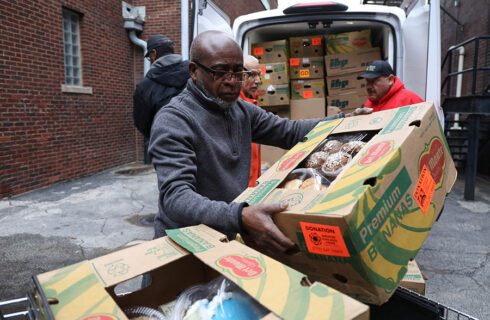Q&A with FRAC’s Ellen Vollinger on proposed SNAP rule change and what to do about it
By Greg Trotter Lost amid the uproar over the now-halted federal shutdown, there's another looming threat to the Supplemental Nutrition Assistance Program (SNAP) that could end up causing more harm in the long run. In late December, the Trump administration announced plans to dramatically curtail the flexibility of states to protect low-income residents from an onerous work requirement within SNAP that applies to so-called “able-bodied adults without dependents.” For years, states, including Illinois, have applied for and received waivers for areas with high unemployment and insufficient jobs, and have been able to apply exemptions for some of their residents who could lose benefits. Under the SNAP work requirement rules, able-bodied adults without dependents have to provide documentation to show they’re working 20 hours a week or participating in qualifying job or educational training. And if they don’t? They can only receive SNAP benefits for three months within a three-year period – what’s often referred to as the ABAWD time limit.
Ellen Vollinger is legal director for Food Research & Action Center, based in Washington D.C.
"Just about every state, at one time or another, has in fact utilized the area waivers and has utilized the percentage exemptions."Q. Why are these waivers so important? A. In practice, we do not find that caseworkers in states are able to thoroughly screen whether individuals are fit for work or not. It’s subjecting a lot of very needy people to a cutoff of SNAP, which may be one of the few resources they have to pay for food. There aren’t that many other benefit programs that they’re able to access. And for the charitable food community, many of their clients increasingly turn for help to food pantries and soup kitchens. I’m sure they very much appreciate the help from that vital network but it’s not enough to make up for what they’re losing in SNAP. Q. It seems like undiagnosed mental illnesses could be a big concern for the population that could be subject to the time limit. A. Absolutely. … There are certain things that can be put down on paper, but how do they work out in real life? This is one where the words might sound good — “able-bodied adults” — but in reality, that determination of who is able-bodied — even communicating this time limit to the population can be confusing and difficult. Notice letters are not always easy to understand. They may or may not have anyone who is helping them with their SNAP application. They may or may not even know about opportunities for exemption. They may not even have access to a medical provider who can certify that the person is not really fit for employment. There are a lot of barriers in practice to how this rule really works.
"It’s certainly a bad result if these folks are losing what is really a lifeline for them."What is also very troubling about this rule is you may have people who are working but they’re working at unsteady, unstable hourly jobs. They may be part-time workers and some weeks they’re not getting 20 hours. Their schedules may be unpredictable. And they’re not part time because that’s what they’ve chosen to do. They either can’t get full time jobs or they are in jobs where their hours got cut back. Q. In simple terms, how would the proposed rule change things? A. The main features of this rule are to curtail what would be considered an area with insufficient jobs. It would be a less comprehensive look at what justifies an area being an insufficient job area. … In this rule, there would also be limits put on the length of time the state can accumulate exemptions. At some point, when a state needs to use them, they won’t be able to. One doesn’t have to do the math on one’s own to know what the harm could be.
"The USDA estimates that this rule change will affect 755,000 people who will lose SNAP benefits. Over a 10 year period, it will take $15 billion of food benefits out of the economy."Q. Would people of color also be disproportionately affected by this rule change? A. They could be. There could be higher unemployment rates for people of color. There could be more job discrimination. There could be labor market factors that make one group more vulnerable to this than others. … There’s a fair amount of opportunity for groups to not be protected when they should be. Q. This proposed rule change has been overshadowed by the federal government shutdown. How do you view these two concurrent threats to SNAP? A. We’re working on both. SNAP is such an important lifeline for people. The people who need the benefits are by definition among the lowest-income people in the country. The benefits are really important to them. They’re also important to the economy and to local communities. They’re important for health and well-being in general.
"We take threats to the federal nutrition safety net, in this case SNAP, very seriously. If the wrong things happen, the consequences would be devastating."The shutdown is a short-term threat but if it were to come to pass that the federal government stopped SNAP benefits, or greatly reduced them for a period of time, that’s hardship across the board for nearly 40 million people. The proposed rule that deals with the time limited population affects a smaller slice of the population but could persist for many, many, many years and have negative ramifications for as far as the eye can see. Q. Now that the proposed rule is posted on the Federal Register, the Food Depository urges people to post public comments in opposition. What can those comments achieve? A. Each one that’s received, USDA will have to review that comment. Whatever they post as a final rule, they will have to explain in that posting, later down the road, what the comments were generally… and they’d have to explain why it is what they’re doing still makes sense. It’s an important part of representative government. It’s an important opportunity for individual people to let the government know what they think about the proposal but also to help inform how they think it’s going to work out in their communities. The Greater Chicago Food Depository is opposed to the U.S. Department of Agriculture’s proposed rule change because it is cruel and unnecessary. Limiting states’ flexibility to protect their most vulnerable residents would only increase food insecurity. Please submit your comment in opposition to the rule change on the Federal Register. Sign up here to receive our action alerts regarding this proposed rule change.
Share This Post



